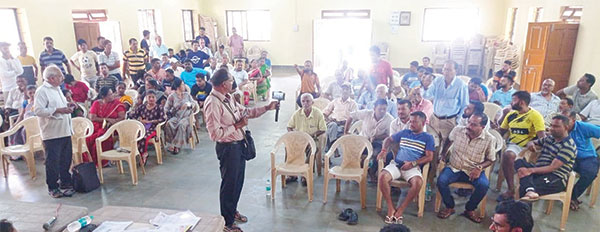
Modernity doesn’t reflect not just from attire worn or gizmos owned. It is also indicated from the thought process of an individual or the society at large. By resolving to ban the age-old regressive widowhood rituals, the villagers of Dhargalim and Corgao have certainly presented a modern outlook.
Not only this. The resolution passed by the two village panchayats will actually set the women free from the restrictions of widowhood make women feel empowered in real sense.
While we celebrate women empowerment and take pride in the fact that women are overtaking men in all spheres of life, there are still some sections of the society, especially in the hinterland villages of Goa, which still force restrictions in garb of traditional customs on a woman after she becomes widow. She is expected live under the shadows of these rituals, where she is not allowed to speak for herself, attend any social gathering. Presence of widow in a marriage is still considered as an ill omen.
Similarly, there are several other restrictions and customs which are imposed on a widow that include prohibition on wearing colourful clothes, sporting a bindi, bangles, cannot celebrate festivals like Holi with colours like red, pink which are said to be signs of married lady. She has to wear colourless or light colour clothes. She cannot freely participate and enjoy any social fiction and occasions.
The most disheartening of all the rituals is the sight widows being made to break their bangles, erase the vermillion from their forehead, remove the mangalsutra and follow a sedated life till she lives.
The two panchayats in Goa have now aim to end these archaic rituals to start a new chapter in the State’s history. It will give some confidence to the women to live their lives with dignity and move out independently for work or doing a business to ensure financial sustainability. Many lose their husbands at very young age. Many women become widow in their 20s. It becomes essential for them to become financially independent. For this purpose, they need to take up jobs or start their own business for survival.
The inspiration for this of course came from Herwad gram panchayat in Shirol taluka of Maharashtra’s Kolhapur district which passed a similar resolution banning practices associated with widowhood.
The resolution passed unanimously by the Herwad gram panchayat stated, “Henceforth in our village no woman would have to undergo the painful rite of widowhood. In case her husband dies, the woman is forced to remove her mangalsutra, shatter her bangles and remove the sindoor from her head. This process is painful for her and a widow is also not allowed to attend any religious or social programme. This cruel and redundant process is hereby banned from our village.”
After the resolution passed unanimously by Herwad gram panchayat in Kolhapur, a group of people from Pernem taluka, including head of a forum name Navchetan Pernem, sub officer of Pernem fire station and others, including two journalists, visited the Herwad village and congratulated the Herwad village. After returning home, they created awareness about this revolutionary resolution in Pernem taluka.
Swati Santosh Gawandi ex sarpanch and present panch member of Corgao panchayat, who proposed the resolution at the Corgao gram sabha said, “I read about this resolution passed by the Herwad village in newspapers and social media. Also my brother-in-law was one of the members of the group which visited the Herwad village to congratulate the panchayat for passing the resolution. After this, a thought came to my mind that our women too should be freed from the clutches of these rituals.”
She said that women are forced to suffer all their lives due to such practices. However, if Herwad village could take steps to stop it in their village, it could be done here also.
“Then I discussed the issue with the ladies of my village and told them that I was thinking of proposing such resolution in our village gram sabha. They expressed their support and told me to go ahead,” Swati Gawandi said.
Gawandi said that when the proposal was read in the gram sabha, there were some people who raised objection. But the women members, who were present for the gram sabha, remained resolute and got the resolution passed.
Gawandi further said, “Women should get respect and right to live their lives even after they lose their husbands. When a woman loses her husband, her bangles are broken, vermillion is wiped off, her mangalsutra and rings from her hands and feet are removed. The lady, who is already reeling under the grief of losing her husband, is made to suffer even more through these acts. This needs to stop.”
All these customs are aimed at subjugating the women. These customs have been present since ages. The most barbaric of all rituals was the Sati system where the widowed woman, either voluntarily or by force, immolated herself on her deceased husband's pyre. The woman who immolates herself is, hence, called a Sati which is also interpreted as a 'chaste woman' or a 'good and devoted wife'.
“This ritual was stopped, which was a huge step forward for the society during the British era. If this could be done then, we can easily stop the existing rituals. It just needs a change in thought process. I appeal people especially the women to create awareness about this and make sure that such things are not followed,” she said.
“The main motive of these resolutions was to give the women right to live, move and work in a safe environment especially to those women who become widow at young age. If we work to implement this resolution, then it will give them the courage and confidence to move forward in their lives and take care of themselves without being dependent on their parents or in laws,” said Vinita Mandrekar, a Corgao villager.
“When a woman becomes widow at young age, some people from the society look at her in a wrong manner. She cannot take up job as she wants, she cannot stay out till late night. But if the same lady wears mangalsutra, then she is looked at in a different way. This mentality needs to change for the progress of women,” another villager said.
“After a woman loses her husband, no matter what age group she belongs to, she is still forced to lead a life of seclusion, where even her own relatives often avoid her during social or religious functions. This makes widows feel guilty for no fault of hers and is left to feel unwanted,” Sarpanch of Corgao village panchayat Uma Salgaonkar said.
"When we learnt that a village in Kolhapur have passed a resolution where they have ban customs which are followed when a women loses her husband, we visited the panchayat and congratulated the panchayat for taking such initiative. We then came to Goa and created awareness which resulted in both panchayats passed resolution that they are going to give respect and right to the women in the society by banning customs of widowhood. This is a revolutionary step that both the panchayats has taken towards widowhood because widows are treated differently in the society after the dead of the husband while live a tearful life," Mahadev Gawandi a resident of Corgao said.
President of Navchetan Yuvak Sangh Krushna Palyekar, who also visited the Herwad village said, "It is good to see the initiative that panchayats in Goa especially in Pernem have taken while going against the customs of widowhood. We should not fall prey to these customs and understand that a woman can move out and stand on their feet if we encourage them by implementing such resolutions. Every panchayat in Goa must pass this resolution and create awareness on the same. I also request Pernem MLA to take this resolution forward and convince all lawmakers to make this as a law for the entire state,” Palyekar said.
Bharat Bagkar, a teacher and villager of Dhargalim who proposed the resolution at gram sabha opined, "This resolution was passed to give justice to the women who are bound with restrictions. From several decades these restrictions are forced in name of customs after they lose their husband. I congratulate the two panchayats for passing the resolutions unanimously. We have witnessed the injustice that happens with women when she becomes widow and how forcibly the vermillion is wiped off, bangles are broken. When we see this, as humans we feel that this is wrong.”
He said that people have been following these customs since decades blindly. But now time has come to put an end to such questionable practices.
“When a woman loses her husband, she is already sad. We don’t have any right to compound her grief by forcing such inhuman customs and bound her with societal restrictions. She too has a life. She has a long journey ahead, which is fraught with lot of difficulties and loneliness. We should strive to make her life easier and not more difficult,” Bagkar said.
Every drop makes an ocean, it is said. The drops of revolution have started trickling. The day is not far when these drops will form into an ocean of change.
